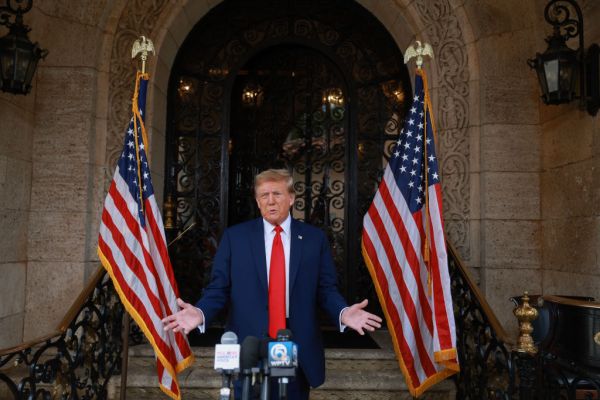Happy Monday! They say crime doesn’t pay, but the Australian woman who stole a delivery van that—unbeknownst to her—was carrying 10,000 Krispy Kreme doughnuts may beg to differ.
Quick Hits: Today’s Top Stories
- Israeli Prime Minister Benjamin Netanyahu withdrew his country’s negotiators from Qatar on Saturday, saying efforts to reach an agreement to restart the ceasefire with Hamas in exchange for the release of the remaining 140 hostages were at an impasse. U.S. National Security Council spokesperson John Kirby said Sunday the U.S. is encouraging the two sides to come back to the table, but emphasized Hamas was to blame for the breakdown in talks after the terrorist organization refused to provide a list of the women and children still in captivity. Meanwhile, the Israeli Defense Forces (IDF) intensified its attacks on southern Gaza over the weekend—the next phase of the invasion of the Strip—particularly in Khan Yunis, a city in the southern part of the territory. The IDF has begun warning civilians ahead of offensives via its Arabic-language spokesperson, Avichay Adraee, offering directions for evacuations along with maps of intended targets.
- Several U.S. executive branch agencies and the Israeli government issued a joint cybersecurity advisory on Friday, warning an Iranian Islamic Revolutionary Guard Corps-affiliated hacking group—called ‘CyberAv3ngers’—is targeting Israeli-made industrial software in the U.S., including water pump systems and other “programmable logic controllers” in the “energy, food and beverage manufacturing and healthcare” industries. Last month, Iran-affiliated hackers breached the software that controls water pumps at a water utility in the Pittsburgh, Pennsylvania, area, forcing the utility to operate the pumps manually.
- Yemen’s Iran-backed Houthi rebels claimed responsibility for four attacks on three separate commercial ships in the Red Sea on Sunday, according to U.S. Central Command (CENTCOM). The USS Carney, a Navy destroyer, came to the aid of the ships—several of which sustained damage from the Houthi missiles—and shot down three unmanned aerial vehicles (UAVs) headed in its direction, though CENTCOM did not confirm whether the Carney was the intended target. The attacks on the ships—one of which, according to Israeli military spokesperson Rear Admiral Daniel Hagari, is in danger of sinking—occurred while they were in international waters. “We also have every reason to believe that these attacks, while launched by the Houthis in Yemen, are fully enabled by Iran,” CENTCOM wrote in a statement. “The United States will consider all appropriate responses in full coordination with its international allies and partners.”
- Using SpaceX’s Falcon 9 rocket, South Korea on Friday launched its first spy satellite from Vandenberg Space Force Base in California, just a week after North Korea claimed it successfully launched its own reconnaissance satellite into orbit. The launch was the first of five satellites the country plans to launch before 2025 under its contract with SpaceX, which is owned by Elon Musk.
- Indian Prime Minister Narendra Modi’s political party, the Bharatiya Janata Party (BJP), was victorious in three of four state elections Sunday—with a fifth state’s results forthcoming—strengthening Modi’s likelihood of success ahead of general elections expected in April of next year. BJP’s sweep of the populous and politically powerful “Northern Belt” states included flipping two states away from the main opposition party, the Indian National Congress. The Congress party was victorious only in Telangana, a smaller southern state.
- The Environmental Protection Agency finalized a rule on Saturday that limits the amount of methane that can be released into the atmosphere by the oil and gas industry. The regulation—announced to coincide with the United Nations’ COP28 climate summit in Dubai—would require oil and gas companies to stop burning excess gas with flares and require regular inspections of facilities to verify any methane leaks have been plugged. If the rule survives the expected legal challenges, the requirements would be phased in over the next two years, and the Biden administration claims they would ultimately cut 58 million tons of methane emissions between 2024 to 2038.
- The House voted 311 to 114 on Friday to expel GOP Rep. George Santos of New York from Congress, with 105 Republicans joining the overwhelming majority of Democrats to oust him—though the four highest-ranking Republican House members, including Speaker Mike Johnson, voted against expulsion. The vote—the second effort to expel Santos—followed both a federal indictment on fraud-related charges and a scathing House Ethics Committee report accusing Santos of misusing campaign funds on personal expenses and lying repeatedly. New York Gov. Kathy Hochul must now set the date of a special election to replace Santos. Only five representatives had previously been expelled from the lower chamber.
- In a 48-page opinion issued on Friday, Judge Tanya Chutkan—the federal judge overseeing former President Donald Trump’s election subversion trial in Washington, D.C.—refused to dismiss the four charges against Trump. Chutkan rejected the argument made by Trump’s lawyers that his efforts to overturn the 2020 election—including by petitioning state and local election officials—were a lawful exercise of his First Amendment rights. “[I]t is well established that the First Amendment does not protect speech that is used as an instrument of a crime,” she wrote. She also batted down the suggestion that Trump’s subsequent impeachment for the same activity in January 2021 renders special counsel Jack Smith’s charges legal double jeopardy. Trump will probably appeal the opinion, setting up a likely delay in the trial and a potential ruling by the Supreme Court on the matter.
- Sandra Day O’Connor, the first female Supreme Court justice, died on Friday at the age of 93. O’Connor was nominated to the bench by President Ronald Reagan in 1981, and stepped down in 2006 to care for her husband, who had Alzheimer’s disease. O’Connor herself died from “complications related to advanced dementia.”
Making an International Murderer

Sometimes the plots of those ubiquitous network TV cop shows are totally outlandish and unbelievable—and sometimes the writers probably wish they could come up with a tale as wild as actual, real-life Department of Justice indictments.
Such was the case Wednesday, when the DOJ unsealed a superseding indictment against Nikhil Gupta, an Indian national who prosecutors allege was part of a foiled murder-for-hire scheme targeting a U.S. citizen and Sikh activist. The indictment comes on the heels of a related accusation earlier this fall from Canadian Prime Minister Justin Trudeau, who alleged before the Canadian parliament that the Indian government was responsible for the June murder of a Sikh leader who was also a Canadian citizen. The U.S. allegations against Gupta and his unindicted and unnamed government contact—which will now play themselves out in federal court—are serious, and could place additional strain on Washington’s burgeoning relationship with India, as the nation is fast becoming an important bulwark against China.
The DOJ’s 15-page superseding indictment filed in the Southern District of New York—which builds on a short, nondescript document from earlier this year—lays out a harrowing plot to kill an unnamed Sikh activist living in New York City. That activist is reportedly Gurpatwant Singh Pannun, an American citizen who serves as general counsel at the U.S.-based organization Sikhs for Justice, which advocates for an independent Sikh state, called Khalistan, in and around the Punjab region of India. The separatist movement has a violent history in India, even if it’s now mostly alive in the Sikh diaspora: In the 1980s, two Sikh bodyguards assassinated Prime Minister Indira Gandhi after she allowed Indian troops to storm the holiest Sikh temple in the Sikh-dominated Punjab. Pannun has been banned from India for his political activity and is also facing terrorism charges there, which he disputes.
This story began in May of this year, when an unnamed Indian government official, whom prosecutors characterize as a “‘Senior Field Officer’ with responsibilities in ‘Security Management’ and ‘Intelligence,’” reached out to Gupta. Gupta lives in India and, according to the indictment, is involved with global narcotics and weapons trafficking. The two of them collaborated to hire a hitman through a go-between in New York City—a covert informant for law enforcement—who dutifully found one for Gupta. And wouldn’t you know, the hitman was an undercover cop.
Gupta negotiated a $100,000 payment for the hitman—ahem, the undercover cop—in exchange for killing Pannun, including an up-front payment of $15,000. Gupta arranged for that money to be delivered to the hitman on June 9, the indictment says, though that payment wasn’t the only thing Gupta gave the would-be assassin: CC-1 (or co-conspirator 1, the Indian official) apparently also provided details about Pannun’s daily life, his address, and his phone numbers, which Gupta passed along.
Keen TMD readers will remember June as a big month for U.S.-India relations, when Indian Prime Minister Narendra Modi made an official state visit to the U.S., and capped his three-day trip—which included a chat with Elon Musk and a speech before Congress—with a state dinner at the White House. The indictment alleges Gupta may have been sensitive to that fact in early June: “Gupta directed the [undercover cop] to carry out the murder as soon as possible, but Gupta also specifically instructed the [undercover cop] not to commit the murder around the time of anticipated engagements scheduled to occur in the ensuing weeks between high-level U.S. and Indian government officials.” On June 11, Gupta sent the Indian official surveillance footage of Pannun. “It looks promising […] but we have today only […] if it doesn’t happen today it will be done after 24th” of June, the official replied. Modi was scheduled to depart the U.S. on June 23.
June was a pivotal month for another reason: Only days before Modi landed in the U.S., an Indian-born Sikh leader in Canada, Hardeep Singh Nijjar, was murdered by several masked gunmen in the parking lot of his temple outside Vancouver, British Columbia. He, too, was active in the Khalistan movement and faced terrorism charges in India. The indictment alleges the New York plot and Nijjar’s killing were linked—the Indian official sent Gupta video of Nijjar’s body in his truck after he was shot, and Gupta told the undercover law enforcement officer that Nijjar “was also the target,” but that they had “so many targets.”
On June 29, Gupta explicitly instructed his “assassin” to kill Pannun, and the next day Gupta was arrested in the Czech Republic for his connection to the conspiracy to kill the activist. The DOJ charged him with two counts of murder-for-hire and conspiracy to commit murder-for-hire.
While that might have been the end of the assassination plot, the political fallout had only just begun. In September, only days after an ascendant India hosted the G20 summit, Trudeau took to the floor of the Canadian House of Commons to accuse the Indian government of involvement in the plot to kill Nijjar. “Over the past number of weeks, Canadian security agencies have been actively pursuing credible allegations of a potential link between agents of the government of India and the killing of a Canadian citizen, Hardeep Singh Nijjar,” a visibly rattled Trudeau told members of parliament. “Last week at the G20, I brought [the allegations] personally and directly to Prime Minister Modi in no uncertain terms.” Biden, too, brought concerns over Nijjar’s death to Modi during the summit, and the Financial Times reported that Biden had also discussed the plot to kill Pannun with Modi then, though a spokesperson for the National Security Council did not respond by the time of publication to TMD’s request to confirm the substance of that conversation.
Following Trudeau’s announcement—which was potentially made possible with help from “contextual intelligence” from the U.S.—Indo-Canadian relations took a nosedive. As we wrote in September:
The Khalistan issue has long been a sticky one for India and Canada. India has often claimed Canada is too sympathetic to Sikh separatists. But if things had chugged along alright before, despite their differences, Trudeau’s claims kicked off a diplomatic doom spiral. Canada expelled a top Indian diplomat, which India reciprocated with a Canadian envoy. Ottawa tabled a new trade agreement between the countries, originally set to be negotiated at a meeting in October. Both countries have issued dueling travel warnings for their citizens. In a dramatic move Thursday, India suspended its visa program for Canadians wishing to travel to India and asked Ottawa to downsize its diplomatic presence in India.
The U.S. wasn’t sitting idly by as allegations swirled in public and—it increasingly seems—in private. Senior U.S. intelligence officials were reportedly dispatched to New Delhi through the late summer and fall to press their Indian counterparts on the allegations. CIA Director William Burns traveled there in August, followed by Director of National Intelligence Avril Haines in October.
It’s still unclear how high up in the Indian chain of command this conspiracy goes—or if the official in question was even working on behalf of the Indian government at all. According to federal prosecutors, Gupta’s co-conspirator “was employed at all times relevant to this Indictment by the Indian government, resides in India, and directed the assassination plot from India.” Be that as it may, the indictment never specifies that he was acting at the behest of the Indian government, to say nothing of links to Modi himself or members of his cabinet. In September, Indian External Affairs Minister S. Jaishankar called the Canadian allegations “not consistent with our policy.”
In response to the indictment, a spokesperson for the Indian external affairs ministry, Shri Arindam Bagchi, said U.S. officials had “shared some inputs pertaining to nexus between organized criminals, gun runners, terrorists and others” which India “takes seriously.” Those “inputs,” he added, are being “examined by relevant departments.” The Indian government also set up a “high-level enquiry committee to look into all the relevant aspects of the matter.”
In response to the U.S. indictment, Trudeau has pushed the Indian government to increase cooperation with Canada’s investigation. In an interview last Sunday on Canada’s CTV News, the Indian High Commissioner to Canada Sanjay Kumar Verma said the Indian government was aiding the U.S. investigation, and not the Canadian inquiry, because U.S. authorities had shared more information than their Canadian counterparts. “There is no specific or relevant information for us to look into” in the Canadian investigation, he claimed.
The latest indictment comes against the backdrop of several significant strides toward closer U.S.-India relations in the last year, which have been bolstered by both countries’ unease with Chinese actions and ambitions in the Indo-Pacific region. As we explained in June, the stakes are high:
For the United States, India is a crucial counterweight to China’s heft in the Indo-Pacific. For India, 2020 border clashes with China—and China’s too-cozy relationship with Pakistan—drove home the rising threat its neighbor poses. “What you have now is an acute awareness in India that it needs to do something about China,” says Manjari Chatterjee Miller, a senior fellow for India, Pakistan, and South Asia at the Council on Foreign Relations. And similarly, “if we see China as our number one threat in the next decade or two decades, then we absolutely need India, we cannot afford to alienate India.”
Will the new allegations in this indictment derail the progress? “Certainly, [the indictment] will be something that the U.S. has to consider going forward,” Clayton Allen, U.S. program director at the Eurasia Group, told TMD. “This does not seem like something that’s going to dramatically limit or substantially impact the pretty substantial progress that’s been made in the larger bilateral relationship. It’s also worth commenting that this seems to have, at this point, somewhat of a tangential link to the Indian government.”
That plausible deniability—at least for now—may be the saving grace for the U.S.-India relationship. Only time will tell how plausible that deniability will remain as the allegations are eventually tested in a court of law. Indeed, so far there’s been limited diplomatic fallout—and nothing even remotely resembling the reaction to Trudeau’s bombshell accusations. The White House has been largely mum on the issue, and Secretary of State Antony Blinken was circumspect when asked about the indictment in Tel Aviv, Israel, on Thursday. “A number of us have raised this directly with the Indian Government in past weeks,” he said. “The government [of India] announced today that it was conducting an investigation, and that’s good and appropriate, and we look forward to seeing the results.”
‘Here Lies a Good Judge’

Sandra Day O’Connor, the first woman to serve on the U.S. Supreme Court, died on Friday at the age of 93 due to complications related to advanced dementia and respiratory illness. While her nomination immediately made history, it was her judicial record—pragmatically seeking a middle position on a number of pivotal issues—that cemented her legacy as one of the most influential justices on the bench, and the most politically powerful woman in the country at the time.
Born in Texas in 1930, O’Connor grew up working on her family’s cattle ranch before graduating from Stanford University and Stanford Law School (where she was classmates with her future benchmate, Chief Justice William Rehnquist). Despite graduating third in her class, O’Connor struggled to get her first job in law—receiving only one offer to be a legal secretary. She started her own private practice before embarking on a career in Arizona state politics, becoming the first woman nationwide to serve as majority leader of a state senate.
During his 1980 campaign for president, Ronald Reagan promised to appoint the first woman to the Supreme Court. In 1981, after the retirement of Justice Potter Stewart, Reagan made good on that pledge through his nomination of O’Connor. “She is truly a person for all seasons,” he said, “possessing those unique qualities of temperament, fairness, intellectual capacity, and devotion to the public good which have characterized the 101 brethren who have preceded her.” O’Connor was unanimously confirmed by the Senate in a 99-0 vote.
O’Connor ruled in cases involving affirmative action, the separation of church and state, states’ rights, and discrimination while on the Supreme Court—without a clear judicial ideology to predict her vote. Hers was a philosophy that analyzed each challenge on a case-by-case basis, seeking the middle ground.
When Planned Parenthood of Southeastern Pennsylvania v. Casey came before the Supreme Court in 1992, once again putting the issue of abortion in the spotlight two decades after Roe v. Wade, O’Connor sided with the majority and upheld the constitutional right to an abortion—despite describing the practice as “abhorrent” in a pre-nomination meeting with Reagan. She, along with Justices Anthony Kennedy and David Souter, penned a joint opinion explaining their decision to protect abortion access, warning that undoing Roe would have “both profound and unnecessary damage to the court’s legitimacy, and to the nation’s commitment to the rule of law.”
The ruling was indicative of O’Connor’s judicial philosophy: one that was not ideological, but practical. “Rare indeed is the legal victory—in court or legislature—that is not a careful byproduct of an emerging social consensus,” she wrote in 2003. For much of her 24-year tenure on the bench, the judicial body was referred to as the O’Connor Court, in reference to the critical importance of her swing vote.
In July of 2005, a still-young (by historical standards, at 75) Justice O’Connor announced that she would retire upon the confirmation of her successor, citing her duty to care for her husband, whose Alzheimer’s disease has taken a turn for the worse. She was eventually replaced by Justice Samuel Alito—but not for several months, as Rehnquist’s sudden death in September 2005 put a priority on naming a new Chief Justice. In her later years, O’Connor advocated for further research into Alzheimer’s disease, and founded iCivics, a nonprofit organization that encouraged a broader study of civics in U.S. classrooms.
Tributes to the late justice poured in over the weekend. President Joe Biden called O’Connor “an American icon,” and noted that while the two did not always agree, he “admired her decency and unwavering devotion to the facts, to our country, to active citizenship and the common good.” In a statement on behalf of the Supreme Court, Chief Justice John Roberts celebrated O’Connor as “a beloved colleague, a fiercely independent defender of the rule of law, and an eloquent advocate for civics education.”
As the first woman on the Supreme Court, questions of legacy followed O’Connor throughout her career—and though her life served as an inspiration and model to women pursuing the legal profession, she remained decidedly focused on her greatest responsibility. “I’ve tried to deal with the tombstone question in the past,” she once told ABC News. “And I’ve always just said that I hope, at the end of the day, it can be said on my tombstone: ‘Here lies a good judge.’”
Worth Your Time
- If you thought tomatoes were basically fine as they are, think again: Seed companies are harnessing the power of R&D to build a better fruit. “Plant breeders at the Woodland, Calif., facility of German pharmaceutical and agriculture giant Bayer are testing whether tomatoes meant for processing into pizza sauces and ketchup can survive on a fraction of their traditional water needs, without sacrificing taste or juiciness,” Patrick Thomas reported for the Wall Street Journal. “Bayer’s tomatoes are one example of how the agriculture industry is now trying to stay ahead of a changing climate that could disrupt the food supply chain and drive up prices for consumers. Partly it is defense. Droughts and rising temperatures globally have taken a heavy toll on agriculture in recent years, and some scientists and agriculture officials expect a changing climate to make extreme weather events more common. At Kraft Heinz, executives said conditions in California have prompted the ketchup maker to consider Washington state for growing tomatoes needed to help produce the seeds for 40 percent of all tomato products sold in grocery stores worldwide.”
Presented Without Comment
NBC News: Police Charge Director of Miss Nicaragua Pageant With Running ‘Beauty Queen Coup’ Plot
“Nicaraguan police said Friday they want to arrest the director of the Miss Nicaragua pageant, accusing her of intentionally rigging contests so that anti-government beauty queens would win the pageants as part of a plot to overthrow the government.”
Also Presented Without Comment
The Seattle Times: U.S. Rep. Adam Smith’s Bellevue Home Spray-Painted with Demands for Gaza Cease-Fire
Toeing the Company Line
- Alex answered your questions—and provides some cocktail recipes—in November’s Dispatch Monthly Mailbag (🔒)!
- In the newsletters: The Dispatch Politics team took a look back at 2015 to see how Trump’s 2023 primary campaign stacks up, Jonah drew a comparison between the illiberal left and the post-liberal right, and Chris previewed (🔒) this week’s Haley-DeSantis debate showdown.
- On the podcasts: Jonah ruminated on Henry Kissinger’s legacy on The Remnant and Jamie debates Shadi Hamid about the U.S. role in Israel’s war in Gaza on the Dispatch Podcast.
- On the site over the weekend: Evan Ellis marked the 200th anniversary of the Monroe Doctrine with a look at what it might mean today, Sherif Girgis celebrated the 30th anniversary of Robert P. George’s seminal work, Making Men Moral: Civil Liberties and Public Morality, and Marvin Olasky examined the intersection of quantum physics and theology.
- On the site today: Philip Wallach bids adieu to George Santos and Nick Hafen explains the Purdue Pharma case before the Supreme Court.
Let Us Know
If the allegations of the murder-for-hire plot are accurate, should the United States rethink its burgeoning partnership with India? Do concerns about countering China outweigh these incidents?









Please note that we at The Dispatch hold ourselves, our work, and our commenters to a higher standard than other places on the internet. We welcome comments that foster genuine debate or discussion—including comments critical of us or our work—but responses that include ad hominem attacks on fellow Dispatch members or are intended to stoke fear and anger may be moderated.
You are currently using a limited time guest pass and do not have access to commenting. Consider subscribing to join the conversation.
With your membership, you only have the ability to comment on The Morning Dispatch articles. Consider upgrading to join the conversation everywhere.